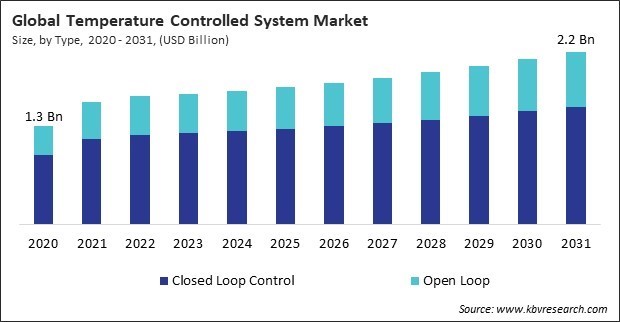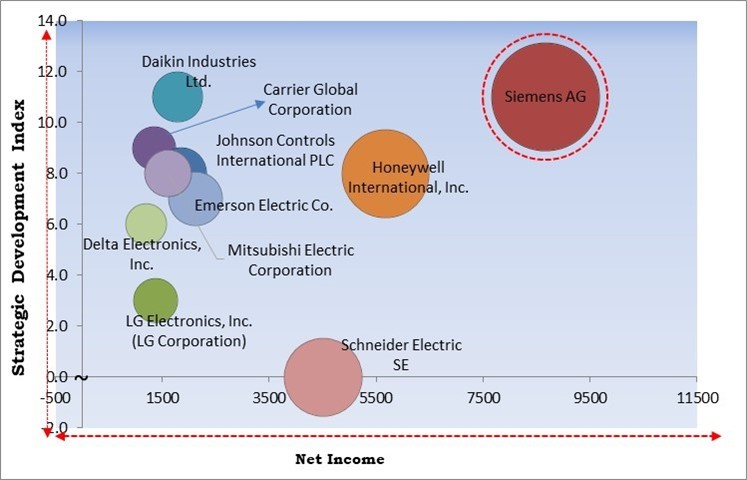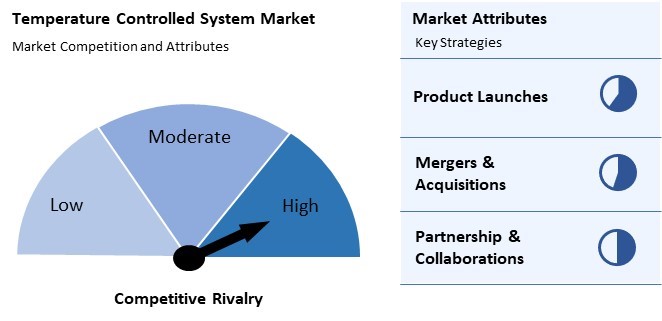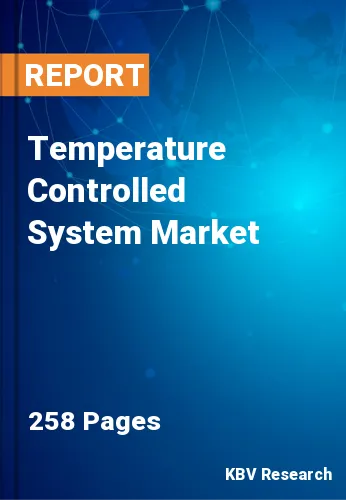“Global Temperature Controlled System Market to reach a market value of USD 2.2 Billion by 2031 growing at a CAGR of 3.7%”
The Global Temperature Controlled System Market size is expected to reach $2.2 billion by 2031, rising at a market growth of 3.7% CAGR during the forecast period.
The Asia Pacific region is undergoing rapid urbanization and population growth, driving demand for residential, commercial, and industrial infrastructure. Therefore, the Asia Pacific region captured $617.04 million revenue in the market in 2022. For example, as per the State Council of China, urbanization has accelerated rapidly throughout China in recent years, with the National Bureau of Statistics estimating that the rate increased to 64.72 percent last year.

The major strategies followed by the market participants are Mergers & Acquisition as the key developmental strategy to keep pace with the changing demands of end users. For instance, In January, 2024, Daikin Air Conditioning UK Ltd., a subsidiary of Daikin Industries, Ltd., completed the acquisition of British service company Robert Heath Heating Ltd. Through this acquisition, Daikin Air Conditioning UK strengthened its residential heating service network in the UK. Additionally, in June, 2023, Johnson Controls International PLC completed the acquisition M&M Carnot. Through this acquisition, Johnson Controls strengthened its capability to provide highly sustainable industrial refrigeration solutions, enhancing its ability to cater to the expanding clientele in this sector.
Based on the Analysis presented in the KBV Cardinal matrix; Siemens AG is the forerunner in the market. In October, 2021, Siemens AG took over Wattsense, a computer networking product manufacturing company. Through this acquisition, Siemens AG would enhance range of building automation solutions tailored for small and mid-sized buildings. Companies such as Honeywell International, Inc., Schneider Electric SE, Emerson Electric Co. are some of the key innovators in the market.

Smart cities prioritize energy efficiency in buildings and infrastructure. Temperature-controlled systems, such as smart HVAC (Heating, Ventilation, and Air Conditioning), contribute to energy savings by optimizing heating and cooling operations based on occupancy, weather conditions, and building usage patterns. Thus, because of the development of smart cities and infrastructure, the market is anticipated to increase significantly.
Healthcare facilities, research laboratories, and biotechnology companies invest in temperature-controlled systems to preserve biological samples, tissues, and specimens for research, diagnosis, and treatment. Ultra-low-temperature freezers, cryogenic storage systems, and liquid nitrogen tanks provide the low-temperature environments necessary for the long-term preservation of biological materials, ensuring sample integrity and viability. Therefore, the market is expanding significantly due to the increase in healthcare expenditure.
Complex maintenance procedures and repairs can result in extended downtime for temperature-controlled systems. When equipment is out of service for maintenance or repair, businesses may experience disruptions in operations, reduced productivity, and potential losses in revenue. Extended downtime can also impact service level agreements and customer satisfaction, damaging reputations. Thus, complexity of maintenance and repairs can slow down the growth of the market.
On the basis of type, the market is segmented into open loop and closed loop control. In 2023, the closed loop control segment held 69.8% revenue share in the market. The precise temperature control provided by closed-loop systems helps maintain product quality and consistency throughout the supply chain. Higher consumer satisfaction and a better-known brand result from consistent temperature conditions, prolonged shelf life, and decreasing product quality variations.
Based on end user, the market is categorized into industrial temperature controlled system, home temperature controlled system, and others. The home segment garnered 32.8% revenue share in the market in 2023. As homeowners increasingly prioritize comfort and convenience, there's a rising demand for residential HVAC systems to maintain comfortable indoor temperatures throughout the year.

By application, the market is bifurcated into refrigerators, air conditioning, water heater, and others. In 2023, the refrigerators segment witnessed 32.9% revenue share in the market. Refrigeration systems are extensively used in the food industry to store and preserve perishable goods such as fruits, vegetables, dairy products, meats, and seafood. Maintaining optimal temperature conditions in refrigerated warehouses, cold storage facilities, and commercial refrigeration facilitates the extension of food products' shelf-life and the prevention of spoilage.
Free Valuable Insights: Global Temperature Controlled System Market size to reach USD 2.2 Billion by 2031
Region-wise, the market is analysed across North America, Europe, Asia Pacific, and LAMEA. In 2023, the North America region acquired 30.7% revenue share in the market. North America experiences various climatic conditions, including hot summers and cold winters. The construction industry in North America is witnessing steady growth, with increasing residential, commercial, and industrial development projects.

The market competition in the Temperature Controlled System Market is generally robust, driven by factors such as technological advancements, product innovation, regulatory compliance, and the increasing demand for temperature-controlled solutions across various industries. Key players in the market continuously strive to enhance their product offerings, expand their geographical presence, and strengthen their market position through strategic initiatives such as mergers and acquisitions, partnerships, and product launches.
| Report Attribute | Details |
|---|---|
| Market size value in 2023 | USD 1.7 Billion |
| Market size forecast in 2031 | USD 2.2 Billion |
| Base Year | 2023 |
| Historical Period | 2020 to 2022 |
| Forecast Period | 2024 to 2031 |
| Revenue Growth Rate | CAGR of 3.7% from 2024 to 2031 |
| Number of Pages | 258 |
| Number of Tables | 353 |
| Report coverage | Market Trends, Revenue Estimation and Forecast, Segmentation Analysis, Regional and Country Breakdown, Competitive Landscape, Porter’s 5 Forces Analysis, Company Profiling, Companies Strategic Developments, SWOT Analysis, Winning Imperatives |
| Segments covered | Type, End User, Application, Region |
| Country scope |
|
| Companies Included | Carrier Global Corporation, Daikin Industries Ltd., Johnson Controls International PLC, Siemens AG, Emerson Electric Co., Honeywell International, Inc., Mitsubishi Electric Corporation, Schneider Electric SE, LG Electronics, Inc. (LG Corporation), Delta Electronics, Inc. |
By Type
By End User
By Application
By Geography
This Market size is expected to reach $2.2 billion by 2031.
Development of smart cities and infrastructure are driving the Market in coming years, however, Complexity of maintenance and repairs restraints the growth of the Market.
Carrier Global Corporation, Daikin Industries Ltd., Johnson Controls International PLC, Siemens AG, Emerson Electric Co., Honeywell International, Inc., Mitsubishi Electric Corporation, Schneider Electric SE, LG Electronics, Inc. (LG Corporation), Delta Electronics, Inc.
The expected CAGR of this Market is 3.7% from 2024 to 2031.
The Industrial Temperature Controlled System segment is generating highest revenue in the Market by End User in 2023; there by, achieving a market value of $1.0 Billion by 2031.
The Asia Pacific region dominated the Market by Region in 2023, and would continue to be a dominant market till 2031; there by, achieving a market value of $840.3 Million by 2031.
Our team of dedicated experts can provide you with attractive expansion opportunities for your business.

 Drivers
Drivers
 Restraints
Restraints
 Opportunities
Opportunities
 Challenges
Challenges
